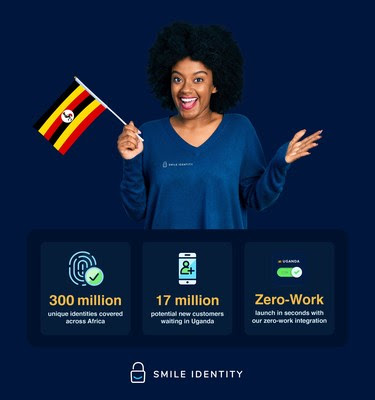Smile Identity fournit des outils de vérification d’identité, de KYC numérique, d’intégration des utilisateurs, de vérification des documents, de vérification de l’authenticité, de reconnaissance faciale, de lutte contre la fraude et de déduplication des données d’identité, qui favorisent la croissance et l’expansion rapides des entreprises et des start-ups en Afrique.
LAGOS, Nigeria, 22 octobre 2021 /PRNewswire/ — Smile Identity, le principal fournisseur de solutions de vérification d’identité, de vérification de documents et de conformité à la procédure KYC numérique en Afrique, a annoncé aujourd’hui avoir ajouté l’Ouganda à sa liste des pays couverts !

Cette étape rapproche l’entreprise, ainsi que ses clients, de son objectif de permettre une couverture complète de la vérification d’identité et du KYC numérique sur l’ensemble du continent africain grâce à une simple intégration à Smile Identity.
Cette avancée porte également le nombre total d’identités uniques couvertes par Smile Identity en Afrique à plus de 300 millions. Smile Identity affiche la plus grande portée et la couverture la plus complète d’identités uniques en Afrique, plus que tout autre fournisseur de KYC et de vérification d’identité sur le continent.
Irshad Muttur , directeur de l’exploitation d’ Aspira , déclare : « Smile Identity nous permet d’intégrer les clients de manière plus sûre, en atténuant les risques de fraude et en permettant une croissance plus confiante de notre entreprise. »
Dès maintenant, tous les partenaires vérifiés de Smile Identity pourront intégrer des utilisateurs en Ouganda en utilisant la carte d’identité nationale ougandaise. La base de données de la NIRA en Ouganda compte 17 millions d’identités uniques. Pour les partenaires de Smile ID, cela signifie que 17 millions de clients potentiels peuvent être intégrés en quelques secondes seulement.
« Grâce à votre intégration actuelle de Smile Identity, vous prenez déjà en charge l’Ouganda. Il vous suffit de le préciser dans le champ du type d’identité », explique Cameron Gray, vice-président chargé des produits et de l’ingénierie.
Comme nous aimons le dire chez Smile ID, vous avez maintenant 17 millions de nouvelles raisons de sourire (Smile) !
À propos de Smile Identity
Smile Identity est le principal fournisseur de procédure Know Your Customer (KYC) et de vérification d’identité en Afrique. Nous aidons les entreprises à se développer rapidement en Afrique en confirmant l’identité de leurs utilisateurs en temps réel, à partir de n’importe quel smartphone ou ordinateur. Notre technologie est alimentée par des algorithmes propriétaires d’apprentissage automatique conçus spécifiquement pour les visages africains, et nos produits comprennent la vérification d’identité, la procédure KYC numérique améliorée, l’intégration des utilisateurs, la vérification des documents, les contrôles de l’authenticité, la reconnaissance faciale, les contrôles antifraude et la déduplication des données d’identité.

Afin de normaliser la vérification d’identité sur tout le continent et de fournir une solution unique à une nouvelle génération d’entreprises africaines, Smile Identity travaille avec les autorités locales chargées de l’identification et a mis au point une plateforme qui combine la validation de l’identité à la reconnaissance facile ainsi qu’à des contrôles d’authenticité exclusifs afin de favoriser l’accès sans surveillance, fondé sur le consentement, et l’inclusion financière. L’entreprise effectue plus d’un million de contrôles d’identité chaque mois dans toute l’Afrique et son logiciel est utilisé dans les secteurs de la banque, de la fintech, du covoiturage, de l’inspection du travail, des programmes publics de protection sociale et des télécommunications. Parmi ses clients figurent des sociétés de paiement comme Paystack, Paga et Chippe
Avec des filiales, des succursales et des ingénieurs au Nigeria, au Kenya, en Afrique du Sud, au Ghana, au Rwanda, en Ouganda et ailleurs, l’équipe en pleine croissance de Smile Identity est composée de personnes originaires de 12 pays différents, dont 8 nations africaines.
Soutenu par Costanoa, CRE Venture Capital, Khosla Impact, LocalGlobe et un grand nombre d’investisseurs providentiels dans toute l’Afrique, Smile Identity favorise la croissance des écosystèmes technologiques sur le continent africain tout en fournissant une infrastructure permettant de renforcer la confiance en ligne. Pour plus d’informations, veuillez consulter le site www.smileidentity.com.
Contact pour les médias :
Ashiwel Ochui
press@smileidentity.com
Liens connexes :
https://smileidentity.com
smileidentity.com/contact-us/
https://cdn.smileidentity.com/
Photo – https://mma.prnewswire.com/
Logo : https://mma.prnewswire.
